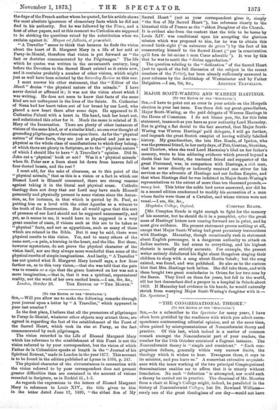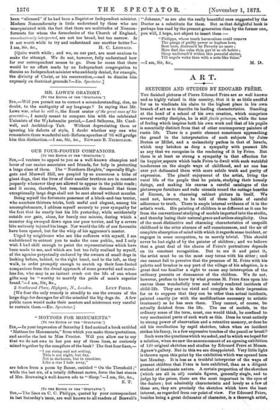"THE CONGREGATIONAL THEORY."
[TO THE EDITOR OF THE "SPECTATOR."] SIR,—As a subscriber to the Spectator for many years, I have often been gratified by the readiness with which you admit corre- spondence controverting editorial opinion, and at the same time, often pained by misrepresentations of Nonconformist theory and practice. Of this last, which indeed is a matter of common remark amongst the Nonconformist part of your readers, the number for the 18th October contained a flagrant instance. The Nonconformist theory is "simple and consistent." "Each con- gregation defines, generally within very narrow limits, the theology which it wishes to hear. Transgress these, it says to its minister, and you leave us." A somewhat extensive acquaint- ance with the inner working of the two principal Congregational denominations enables me to affirm that it is utterly without foundation. No such " definition" is attempted, nor could such a theory be carried out in practice. The dismissal of Mr. Maurice from a chair at King's College might, indeed, be paralleled in the history of Nonconformist Colleges, but Dr. Rowland Williams— surely one of the great theologians of our day—would not have been "silenced" if he had been a Baptist or Independent minister. Modern Nonconformity is little understood by those who are unacquainted with the fact that there are multitudes of Noncon- formists for whom the formularies of the Church of England, conscientiously interpreted, are not too broad, but too narrow. Is it not worth while to try and understand one another better ?— [Quite worth while ; and we, on our part, are most anxious to make the attempt. We do not, however, fully understand how far our correspondent means to go. Does he mean that there would be no effort made by an Independent congregation to dismiss an Independent minister who suddenly denied, for example, the divinity of Christ, or his resurrection,—aud to dismiss him expressly on doctrinal grounds ?—En. Spectator.]



































 Previous page
Previous page